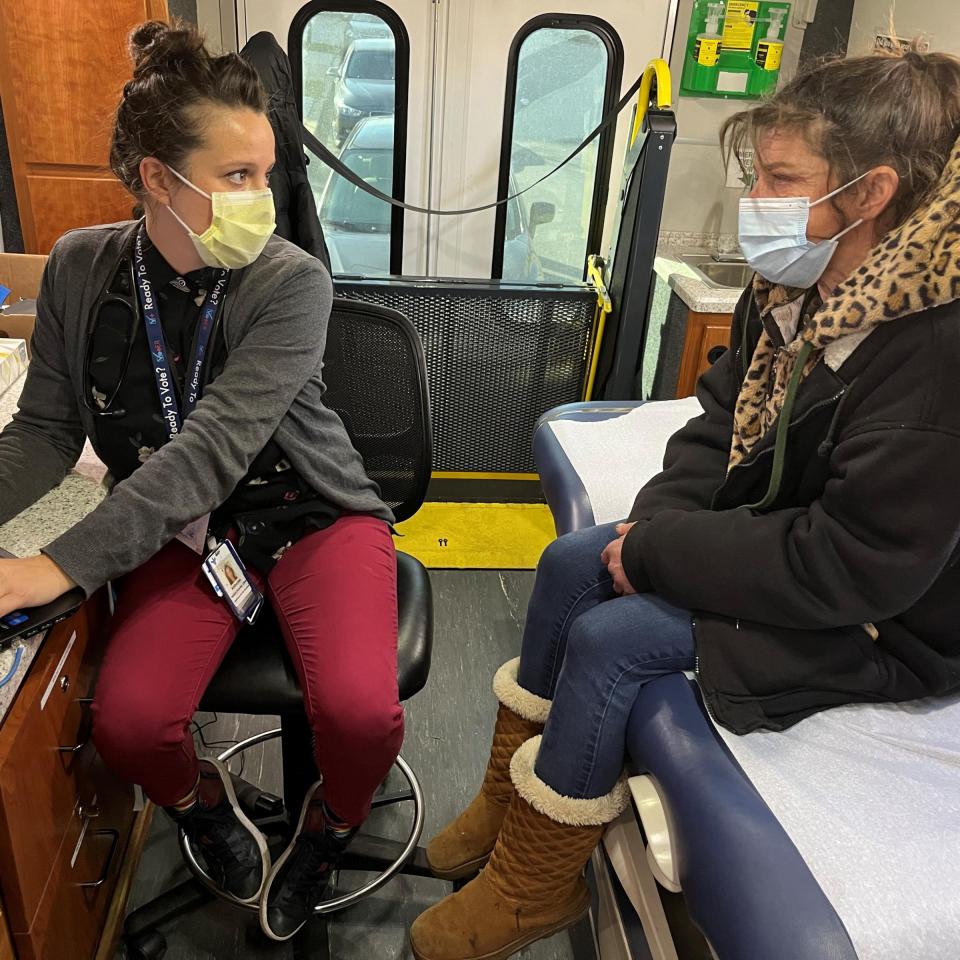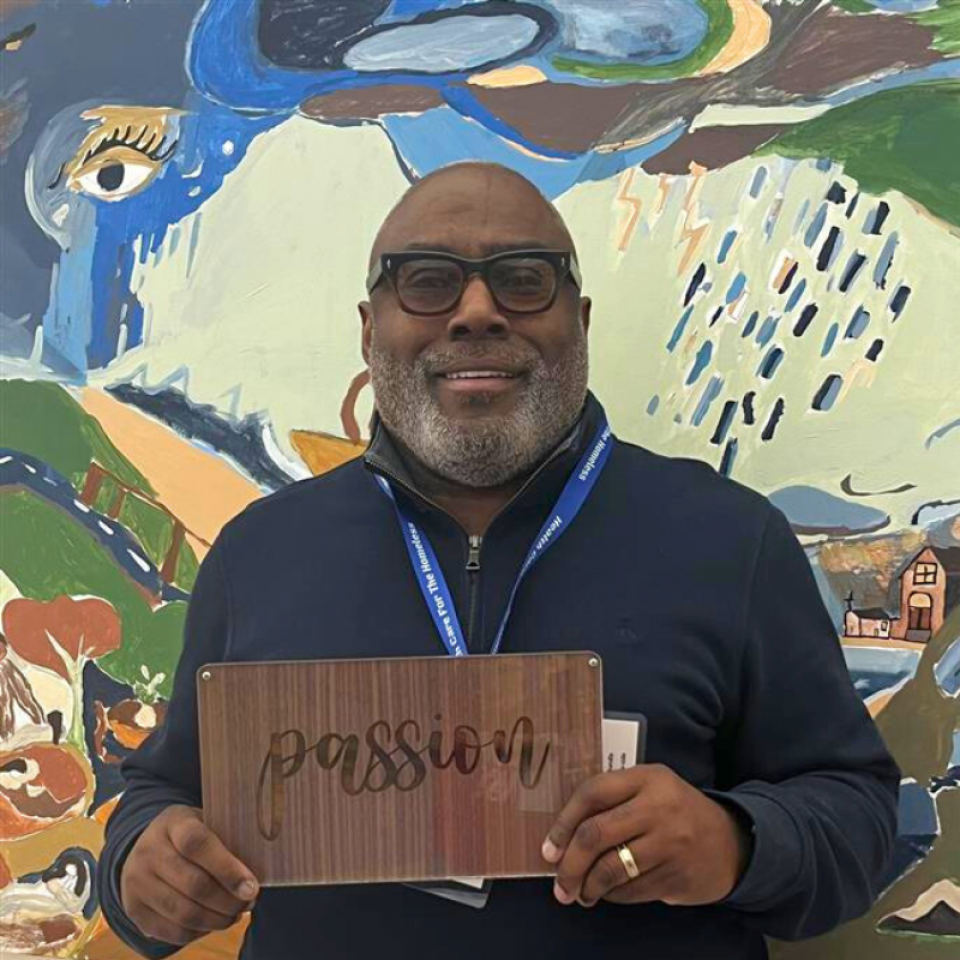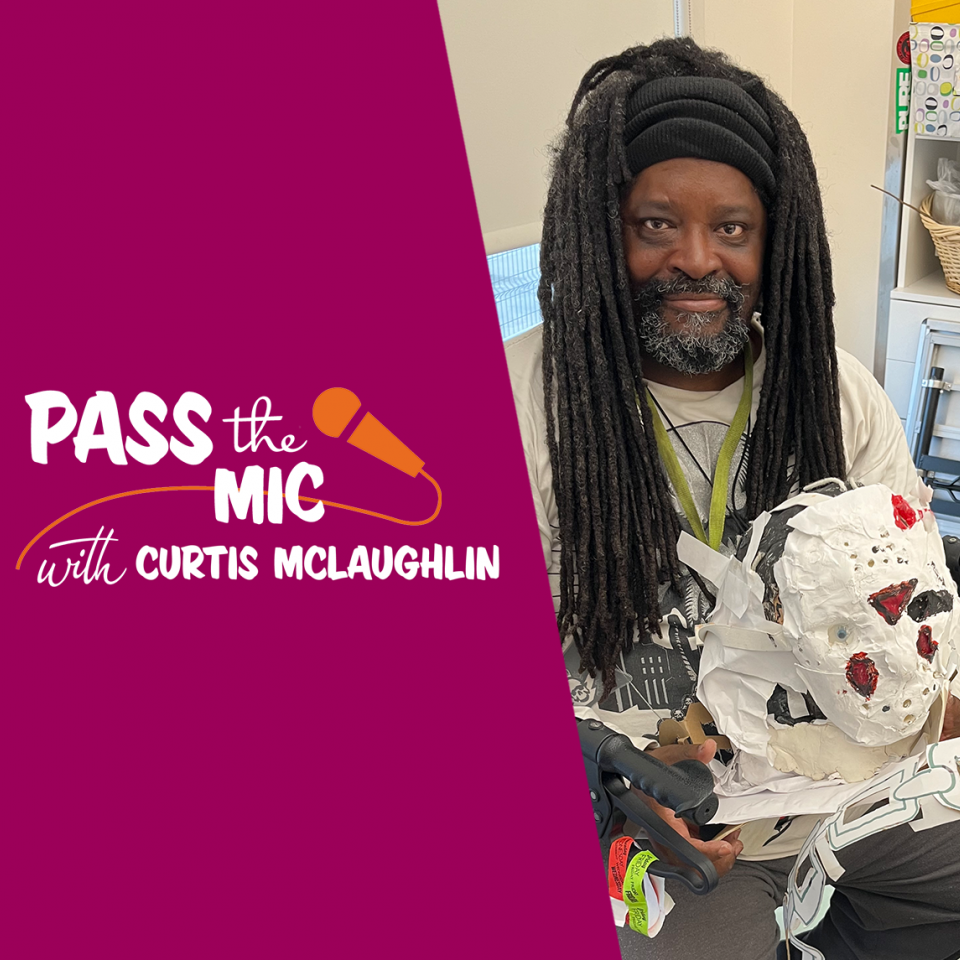May is Asian American, Pacific Islander, and Native Hawaiian Heritage Month, a time to celebrate and honor the diverse cultures, histories, and contributions of these communities.


01.24.23
"Day in the life" features a closer look into staff members' perspectives and work on-the-ground.
1:00 pm. Outreach Services Manager John Lane easily navigates the bumpy roads of West Baltimore and pulls the Mobile Clinic up to The Food Project, one of our regular community sites. It’s a clear and sunny day, and a small crowd is already waiting.
1:10 pm. John steps out of the van and greets the regulars he recognizes. Also on board are Sarah Barry, Medication Assisted Treatment (MAT) Nurse and Katharine Billipp, CRNP.

Above: Outreach Services Manager John Lane in the driver’s seat. The Mobile Clinic provides full-service medical care.
1:21 pm. The first client, Anne, steps on. After checking in with John and getting her vitals assessed by Sarah, she shouts, "You're next!" to a friend outside and heads to see Katharine in the back.
Katharine checks Anne’s lungs, remarking how much better they sound. She asks how Anne’s addiction treatment is going. “Good,” she says. In her temporary housing, she is hiding her suboxone between the pages of a dictionary to keep it safe.
Anne’s chronic back pain is flaring up. After six knee surgeries and a broken leg in her youth, one of her legs is shorter than the other. Katharine talks to her about how to make a DIY heating pad with an athletic sock filled with rice. It can be heated up in the microwave. Anne doesn’t live anywhere with electricity, but Paul’s Place, where Anne often gets her meals, might let her use theirs.
“Could we get you a lift in one shoe?” asks Katharine. Anne’s never tried it; she and Katharine decide she should be referred to a podiatrist.

Above: Katharine Billip, CRNP and Anne during an exam. Anne is a regular on the Mobile Clinic. Here, she's seen for vaccinations, MAT, and several chronic conditions.
2:15 pm. John takes a call from the staff inside The Food Project. A family, recently arrived from Peru, all need to be seen. Can John fit them in? He clucks his tongue, eyeing the line outside, and helps them set up appointments later in the week.
2:34 pm. A couple comes in for a medical check-up. Each get a general exam and talk to John about housing. Neither have been to our downtown location—they’d need bus tokens or help with transportation. John suggests a virtual appointment with a case manager. “That’s what’s up,” the woman says. “Come back and tell me how it goes!” replies John.
2:50 pm. There’s a knock at the door. A woman, not on the schedule, says, “I’m not trying to get seen or anything, but I was hoping I could just get wound care?”
Generally, she takes care of her own wounds—it's either that or the E.R. She just wants supplies; she also has a friend with a bad infection, but he won’t come to the van. John does a quick assessment and asks her to wait so they can fit her in.
3:00 pm. John gets a new client named Tom set up in the system. Sarah gets his vitals and discovers a bad infection, and Katherine walks him through basic wound care. Tom asks about our MAT program and how he and his girlfriend might get treatment. Once he learns about another mobile clinic site, closer to where they’re staying in Dundalk, he thanks the team and says they’ll both be back Friday morning.
3:30 pm. The team is supposed to stop seeing clients now to leave by 4 pm, but there’s a knock at the door. “I got something on my face,” a man explains. “Is it ringworm or something?” Sarah does a quick assessment, advising him to keep using over-the-counter fungal cream and to come back tomorrow.
There’s another knock at the door. An older woman, looking a little dazed, asks for a syringe kit. Sarah gives her a mask, sits her down on the couch, and talks through the kit. She asks where and when she is injecting. “Just be careful, okay?” Sarah says gently. John sets her up with a street hygiene kit—a drawstring backpack with toiletries, some food, a bottle of water, a clinic brochure. She thanks them and leaves.

Above: John shows the contents of a safe use kit: clean syringes, gauze, antiseptic, Narcan, and other supplies for safe injecting. Wound care is a common problem for people who use substances, and some treatment programs and service providers won’t see anyone with open wounds.
3:50 pm. Katharine, John, and Sarah begin breaking down the clinic. They turn chairs on their sides, unplug electronics and wipe down all surfaces.
In a three-hour window, the team cared for nine people. They assessed a hernia and an abdominal mass; treated cellulitis, asthma; gave vaccines; ordered an ultrasound. They wrote prescriptions for Mucinex and Nicoderm, let people charge their phones. They prescribed and refilled suboxone, distributed condoms, bottled water, and crackers. “Most of the week I work at our West Baltimore clinic," says Katharine. "But if I could, I'd be on the mobile clinic every day."
To learn more about our Outreach Services:
More Recent News
Gregory Rogers is a Senior Community Health Worker (CHW) with years of experience in addiction counseling. A vital part of a client’s care team, CHWs work with clients to navigate care both in the clinic and out in the community. See how Greg spends his days!
An artist, gamer, and movie lover, Curtis McLaughlin has been part of the Health Care for the Homeless Art Group for more than five years. Get to know Curtis in the lasted edition of "Pass the Mic".
Client storytelling is a staple of the nonprofit business model, ever present in advocacy, clinic tours, fundraising—and news articles like the one you are reading right now.


